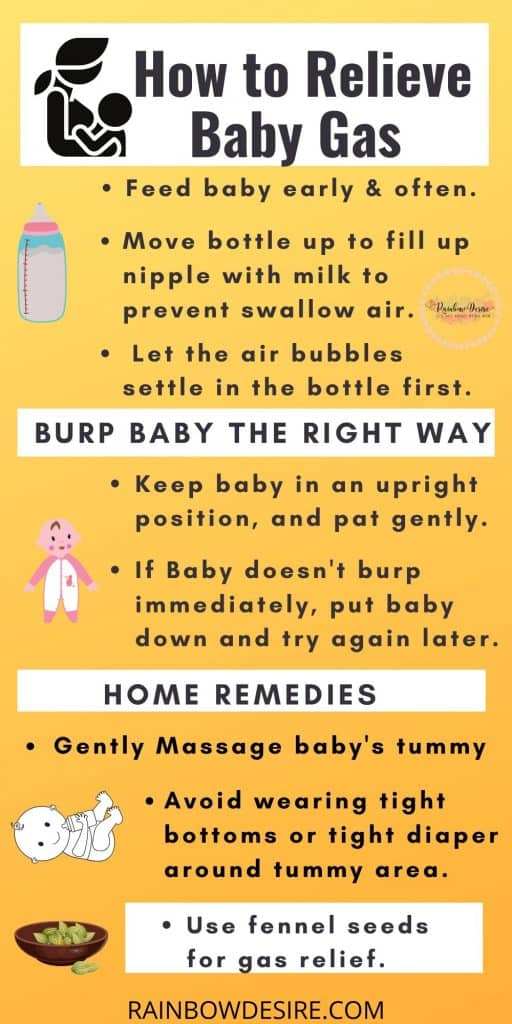A gassy newborn is completely common and normal because of infants’ tiny and immature digestive tract. The newborn’s digestive system is still in the maturity phase, so it gets hard for a baby to release gas on her own.
Newborns tend to swallow a lot of air while crying or feeding. This would have a lot of gas accumulated in their tiny tummy, and it has to come out two ways. Up or down.
However, Burping is relatively easy, whereas passing gas down there is one kind of a journey from all stomach to intestines and finally the way out. That’s why burping is very important after every feed.
This post may contain affiliate links. Please read our disclaimer for more information.
how to relieve newborn gas problems
1. Feed early and often
If your baby is colic or has more than normal gas issues, feed her early, let’s say not after 2 hours instead, feed her after 1.5 hours. An empty stomach can trigger gas issues.
2. Keep baby upright after feed
Once the baby gets her meal, keep her upright and elevated for at least 20 to 30 minutes. This will help keep everything down.
3. Bottle up to fill in the entire nipple to avoid air going inside
You have to make sure, while bottle feed, no matter breastmilk or formula, you need to keep the nipple inside the baby’s mouth by moving the bottle up to fill the entire nipple to avoid too much air going inside.

Using anti-colic bottles would keep the baby from swallowing unnecessary air while feeding.
4. Let the bubbles in the milk settle
Shaking a milk bottle will form bubbles in the bottle; wait for a few minutes until most of the air bubbles settle down. This will also help with gas.
5. Burping the right way
When burping your newborn, you must keep these steps in mind.
What is the right way to burp a baby?
Burping can be tricky at times. If you are a first-time mom, you need to know the right way to burp so that you and your baby can have a peaceful time after nursing. Burping is essential after every feed, regardless of how big or small the feed is.

These are some effective ways you can help burp your baby.
1. Positioning
You have to position your baby upright and elevated on your shoulders or in a sitting position once your baby is a few weeks old. Early sitting can be harmful to the baby’s back. Do not sit them for too long.
2. Patting
A gently patting from upwards to downwards and downwards to upwards would work well for burping. You have to be gentle while rubbing your baby’s back.

3. Postpone it for a while and try later
If it’s been more than 10 minutes and your baby is not in a mood to burp, you can try it later or wait for your baby’s cues when she wants to burp.
Have baby lay down slightly elevated or in a bouncer if the baby does not seem interested in burping or falls asleep. However, if the baby wakes up crying, most likely it is a need to burp.
4. Patience
Motherhood requires patience. Burps could take a while to come out. Don’t stress, and do not rush burping your baby. This is a calm process. Sometimes it might happen within a second, and sometimes it could take hours.

How to pump gas out of babies
There are ways that can help you pump out gas effectively when it is hard to pass.
1. Cycling baby legs
Moving the baby’s legs in a circular motion will help get all those gases locked quickly.
2. Newborn gas tummy Massage
Take a few drops of olive oil or coconut oil and massage gently on the baby’s tummy and navel area. In a circular motion. This will help the baby’s muscles to relax and pump-out gas.
Another advantage of massage is that your baby will feel much more relaxed and sleep for another couple of hours.
For massage, any of these options are safe to use.
Organic Ghee can also be used for massage. The only con of using organic ghee is the smell. Other than that, it is the best option for newborn massage.

3. Putting on Comfy clothing
Newborn clothes are just too cute to be true. You want to get every stylish thing on the planet for your munchkin. The truth is that the right clothing is very important for gas circulation and going out.
Newborns grow out of 0-size clothes pretty fast. Always make sure bottoms are not tight around the navel area. They should have enough elasticity and room for the baby to feel relaxed and comfy.
Newborn onesies are the best outfit for the first several months, at least.
4. Using Windi
Windi is another effective product many parents swear by. All you have to do is gently insert it into the baby’s rectal area to help release gas when the baby is having a hard time releasing it on her own.
5. Best baby Gas drops at night
Your baby gets gassy at night? It is safe to give baby gas drops at night to have more chances of restful sleep. Always consult your pediatricain for the suitable dose as per the baby’s age.
Some babies, if not all, may not have gas issues or manage to help release gas or burp without any delay, whereas some may have trouble or delayed burping issues due to developing digestive systems.
Using gas drops helps significantly. You can use any of the following. They both work effectively, at least for my kids. You can try what works for you.

Mommy bliss night-time gripe water works like a charm every time. The ingredients like chamomile help babies to sleep so much better at night.
You can use gas drops as little remedies for good sleepers, and for light sleepers, I highly recommend mommy bliss nighttime gripe water.
6. Avoid pacifiers for the first few weeks
I offered my daughter a pacifier when she was about two weeks old. Unfortunately, I didn’t know that it is way to early to offer a pacifier. She was starving, and I was struggling with the milk supply. She got so much gas accumulated in her stomach due to unnecessary sucking. I never offered her a pacifier again.
If you want to start a pacifier for your newborn, chances of success are higher if you start after 4 to 6 weeks post-birth, depending on how well your milk flow has established.
7. Baby and hiccups – How to relive baby’s hiccups
Yes, babies do have hiccups, and you cannot have them hold their breath to treat them right away.
Although hiccups are unavoidable and bother parents more than babies. How you can help with hiccups?
Let it be – It will stop eventually. Just let it be, and let’s not stress over something you cannot control.
Crying may help – However, letting the baby cry for some time may help.

Feeding milk slowly and gradually, sips by sip, may help.
8. How to help Colic babies
Although colic babies tend to get over with unstoppable crying in about 4 to 6 months after birth. However, using probiotic drops for them may help significantly.
Related: Learn more about how to soothe a crying or colic baby.
New breastfeeding moms should avoid eating gassy foods for the first several weeks after birth as it may upset the baby’s sleep due to gas pain. This is the best way moms can minimize gas problems.

Do formula-fed babies have more gas issues?
Usually, the formula is not suitable for babies who have sensitive digestion. Since breastmilk is lighter and easy to digest faster, breastfed babies have relatively fewer gas issues.
Uk – approved My organic company offers the Kendamil goat milk for infants with sensitive stomachs, and parents love no-gas issues for the babies.
Related: The ultimate guide to the European organic formula for your baby.
What foods moms should avoid for baby gas?
Since newborn gas is quite normal but if the baby gets too much gassy after every feed, especially the breastfeeding babies, moms need to review their diet to avoid painful gas issues for them. Although gas triggers may vary from one mom to another, but in general, raw veggies like cauliflour, chick peas, lentils etc may take a while for babies to get used to. It is better to avoid eating them for at least first six weeks until the infant’s digestive tract gets stronger.
Newborn Gas Home Remedy
Instead of using gas drops too often, you may want to give your baby natural relief for gas issues. Gas home remedy is easy to make and effective for babies’ gas issues.
To prepare fennel water, you need about 2 cups of water. Add 1 tsp of fennel seeds. Boil fennel seeds in water until water gets half in quantity.

Fennel seeds is the best remedy for gas. Feed one ounce of water every day or at night as needed.
Tip: Also, you can add formula in fennel seed water for severe gas issues. Keep a bottle filled with fennel water and consume all day for formula feedings.
Gas is a common issue for moms during pregnancy and after childbirth. For C-section moms, gas is super painful. The best way to avoid gas issues moms must consume fennel seeds in their diet every day. Especially breastfeeding moms would significantly help improve gas problems in babies by simply adding fennel seeds to their diet for the first several weeks.
Have a small container of fennel seeds at your nursing station or in your pantry. Take a teaspoon of fennel seeds after every meal for the first several weeks after birth or whenever you feel bloated or have gas issues during pregnancy or post-pregnancy. I am telling you, from my experience, tried and tested, that fennel seeds are the best remedy to relieve gas for adults, toddlers, and babies.
Learn more about a healthy postpartum diet for breastfeeding moms.












